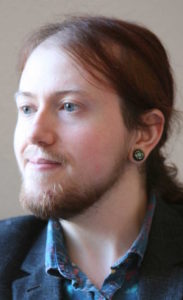Note: More information on that course is available on the web-site of the Benedictine Institute here.
Latin Fourth Experience = Advanced Latin
Academic Term 2015-2016
This advanced course is offered during weekly sessions during the academic term. It covers the same elements of the langauge as L711 Proficient Latin for Liturgists, but without the focus on liturgical texts. Instead, Latin literature is drawn from every era and very many authors.
 Tutor: Daniel Vowles
Tutor: Daniel Vowles
Sessions: We offer weekly sessions in beginning, intermediate and advanced Latin. Sessions held at the Benedictine Institute, 74 Castlebar Road, Ealing, London W5 2DD.
Previous knowledge: This course presumes a familiarity with the verb in all times of the indicative and subjunctive and imperative in both the active and the passive and the deponent. It reviews the sequence of tenses and the many usages of the subjunctive in both Latin and English. It presumes a familiarity with the natural meaning of the four participles and reviews their use in the ablative absolute. It presumes a familiarity with all of the functions of nouns and adjectives.
Because our system of presenting the Latin language follows that of Reginald Foster as presented in his book Ossa Latinitatis Sola, new students, even if they have considerable experience in Latin, are recommended to learn this system by completing LA611 Intermediate Latin before enrolling in this advanced course.
Aims: By the end of the course, student will be prepared to:
i. follow the sequence of tenses,
ii. discern between many uses of the subjunctive and
iii. handle these differently in Latin and English,
iv. recognize and work with object sentences,
v. produce the natural meaning of the four participles,
vi. convert the gerundive to a gerund and vice versa,
vii. use several of the fourteen ways to express purpose
viii. recognize and work with conditional sentences.
Course Material
At the advanced level, students are strongly encouraged to purchase or bring their own copy of this one dictionary:
♦ LEWIS, C.T. – C. SHORT, A Latin Dictionary, Oxford UP, Oxford – New York 1879, reprinted 1995.
The following guide is our standard
♦ GILDERSLEEVE, B.L, – G. LODGE, Gildersleeve’s Latin Grammar, Bolchazy-Carducci, Wauconda IL 2003, reprint of 31895 (GL).
♦ FOSTER, R.T., – D.P. MCCARTHY, Ossa Latinitatis Sola ad mentem Reginaldi rationemque: The Mere Bones of Latin according to the thought and system of Reginald, (Latinitatis Corpus 1), Catholic University of America Press, Washington DC 2016.
Description of learning activities: The course has three daily activities.
1. Students sight-translate the Latin expression of many authors from different ages and types of literature with the help of the teacher and a complete Latin dictionary like Lewis and Short. All discuss unfamiliar aspects of the Latin texts as they arise.
2. In each encounter the instructor presents one specific way in which Latin functions and is expressed, with opportunity for review. Examples are provided, based on which students generate new examples.
3. Students prepare outside of class brief daily ludi domestici or “home games” with which students teach themselves the Lain language by learning from the examples of Latin authors on which they base their personal Latin compositions.
More Information is available on the web-site of the Benedictine Institute here.
Enrol: Enquire and Enrol by contacting the Registrar by e-mail at il AT liturgyinstitute DOT org or by pone or post available here.
Note: Students must be over 18 years of age.
Location: Institutum Liturgicum London (at Ealing Abbey)
74 Castlebar Road Ealing London, W5 2DD, UK
Telephone: +44 (0)20 8862 2156 Fax: +44 (0)20 8862 2133
For further details or to register contact the Centre at:
E-mail: il AT liturgyinstitute DOT org